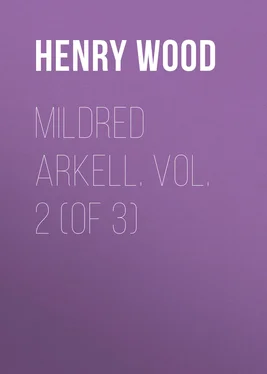Henry Wood - Mildred Arkell. Vol. 2 (of 3)
Здесь есть возможность читать онлайн «Henry Wood - Mildred Arkell. Vol. 2 (of 3)» — ознакомительный отрывок электронной книги совершенно бесплатно, а после прочтения отрывка купить полную версию. В некоторых случаях можно слушать аудио, скачать через торрент в формате fb2 и присутствует краткое содержание. Жанр: foreign_sf, literature_19, foreign_antique, foreign_prose, на английском языке. Описание произведения, (предисловие) а так же отзывы посетителей доступны на портале библиотеки ЛибКат.
- Название:Mildred Arkell. Vol. 2 (of 3)
- Автор:
- Жанр:
- Год:неизвестен
- ISBN:нет данных
- Рейтинг книги:4 / 5. Голосов: 1
-
Избранное:Добавить в избранное
- Отзывы:
-
Ваша оценка:
- 80
- 1
- 2
- 3
- 4
- 5
Mildred Arkell. Vol. 2 (of 3): краткое содержание, описание и аннотация
Предлагаем к чтению аннотацию, описание, краткое содержание или предисловие (зависит от того, что написал сам автор книги «Mildred Arkell. Vol. 2 (of 3)»). Если вы не нашли необходимую информацию о книге — напишите в комментариях, мы постараемся отыскать её.
Mildred Arkell. Vol. 2 (of 3) — читать онлайн ознакомительный отрывок
Ниже представлен текст книги, разбитый по страницам. Система сохранения места последней прочитанной страницы, позволяет с удобством читать онлайн бесплатно книгу «Mildred Arkell. Vol. 2 (of 3)», без необходимости каждый раз заново искать на чём Вы остановились. Поставьте закладку, и сможете в любой момент перейти на страницу, на которой закончили чтение.
Интервал:
Закладка:
It was more than Mrs. Dundyke could; and though, from that morning, the great merchant and his lady took pains to cultivate the intimacy thus formed, she never took to them so cordially as her husband. He, if one may use the old saying in such a sense, fell over head and ears in love with both, but Mrs. Dundyke never could feel quite at home with either. No doubt the sense of her own inferiority of position partly caused this: she felt, if her husband did not, that they were no society, even abroad, for the powerful Mr. and Mrs. Hardcastle. And, in her inmost heart, she did not like the lady. Her attire was ten times as costly and abundant as Mrs. Dundyke's, and she would wear more jewellery at one time than the latter had ever seen in all her life; and that was perhaps as it should be; but Mrs. Dundyke was apt to take likings and dislikings, and she could not like this lady, try as she would. She was certainly not a gentlewoman; and Mrs. Dundyke, with all her previous life's disadvantages of position, was that at heart, and could appreciate one. She decidedly wore rouge on her cheeks in an evening; she was not choice in her expressions at all times; and she was fond of wine, and did not object to brandy.
One morning Mrs. Dundyke happened to be in Mrs. Hardcastle's room, when the English waiter entered.
"My master's compliments, madam," he said, "and he hopes Mr. Hardcastle has some news for him this morning."
The lady's face went crimson, the first time Mrs. Dundyke had seen any natural colour on it, and she answered, in a haughty tone, that Mr. Hardcastle was not then in—when he was, the man could speak with him.
"For it is now a fortnight, madam, since he has daily promised to–"
"I have nothing to do with it," interrupted Mrs. Hardcastle, imperiously motioning the waiter from the room; "you must address yourself to my husband."
Mrs. Dundyke wondered what this little scene could mean. Had it been people of less known wealth than the Hardcastles, she might have thought it bore reference to the settlement—or non-settlement—of the bill. But that could scarcely happen with them.
"What are you thinking of, Betsey?" Mr. Dundyke asked her that same day, she sat so deep in thought.
"I was thinking of Mr. Hardcastle's eyes."
"Of Mr. Hardcastle's eyes!" echoed the common-councilman.
"Just then I was, David. The fact is, they puzzle me—they are always puzzling me. I feel quite certain I have seen them somewhere, or eyes exactly like them."
"They are as handsome eyes as ever I saw," was the answer.
"They may be handsome, but I don't like them. But that it is wrong to say it, I could almost say I hate them. They frighten me, David."
"That's just one of your foolish fancies," cried Mr. Dundyke, in wrath. "You are always taking them up, you know."
A day or two after this, Mr. Hardcastle came straight into the presence of Mr. Dundyke, some papers in his hand. "My dear sir," he said, "I want you to do me a favour."
The common-councilman jumped up and placed a chair for the great man, delighted at the prospect of doing him a favour.
"I wrote home a few days ago for them to send me a letter of credit on the bankers here. It came this morning, and just see what they have done!"
Mr. Hardcastle tossed, as he spoke, the letter of credit to Mr. Dundyke. Now the latter, shrewd man of business though he was amid his own chests of tea, knew very little of these foreign letters of credit, their forms, or their appearance. All he could make out of the present one was, that it was a sort of order to receive one hundred pounds.
"Don't you see the error?" exclaimed Mr. Hardcastle. "They have made it payable to my uncle, Stephen Hardcastle, instead of to me. My name's not Stephen, so it would be perfectly useless for me to present it. How the clerks came to make so foolish a mistake I cannot tell. Some one of them I suppose, in the pressure of business, managed to give unintelligible orders to the bankers, and so caused the error."
"Dear me!" said Mr. Dundyke.
"Now I want to know if you can let me have this sum. I shall write immediately to get the thing rectified, and if you can accommodate me for a few days, until the needful comes, I will then repay you with many thanks."
"But, dear me, sir!" exclaimed Mr. Dundyke,—"not but what I should be proud to do anything for you that I could, in my poor way—you don't suppose I've got a hundred pound here? Nor the half! nor the quarter of it!"
Mr. Hardcastle carelessly smiled, and played with his glittering cable watch-chain.
"I should not like to offer you what I have got, sir," continued the common-councilman, "but I am sure if you took it as no offence, and it would be of any temporary use to you–"
"Oh, thank you! No, it's not that," interrupted the great merchant. "Less than the hundred pounds would not be worth the trouble of borrowing. You have nothing like that sum, you say?"
Out came Mr. Dundyke's purse and pocket-book. He counted over his store, and found that, English and French money combined, he possessed twenty-two pounds, eleven shillings. The twenty pounds, notes and gold, he pushed towards Mr. Hardcastle, the odd money he returned to his pocket. "You are quite welcome, sir, for a few days, if you will condescend to make use of it."
"I feel extremely obliged to you," said Mr. Hardcastle; "I am half inclined to avail myself of your politeness. The fact is, Dundyke," he continued, confidentially, "my wife has been spending money wholesale, this last week—falling in love with a lot of useless jewellery, when she has got a cartload of it at home. I let her have what money she wanted, counting on my speedy remittances, and, upon my word, I am nearly drained. I will write you an acknowledgment."
"Oh no, no, sir, pray don't trouble to do that," cried the confiding common-councilman, "your word would be your bond all over the world." And Mr. Hardcastle laughed pleasantly, as he gathered up the money.
"Can you let me have five francs, David," said Mrs. Dundyke, coming in soon afterwards, when her husband was alone.
"Five francs! What for?"
"To pay our washing bill. It comes to four francs something; so far as I can make out their French figures."
"I don't know that you can have it, Mrs. D."
"But why?" she inquired, meekly.
"I have just lent most of my spare cash to Mr. Hardcastle. He received a hundred pound this morning from England, but there was a stupid error in the letter of credit, and he can't touch the money till the order has been back home to be rectified."
The information set Mrs. Dundyke thinking. She had just returned from a walk, and it was in coming up the stairs that a chambermaid had met her and given her the washing-bill. Not being accustomed to French writing and accounts, she could not readily puzzle it out, and, bill in hand, had knocked at Mrs. Hardcastle's door, intending to crave that lady's assistance. Mr. Hardcastle opened it only a little way.
"Is Mrs. Hardcastle at leisure, if you please, sir?" she asked.
"No; she's not in. I'll send her to you when she comes," was his reply, as he re-closed the door. And yet Mrs. Dundyke was almost certain she saw the tip of Mrs. Hardcastle's gown, as if she were sitting in the room on the right, the door opening to the left. And she also saw distinctly the person who had been once pointed out to her as the landlord of the hotel. He was standing at the table, counting money—a note or two, it looked, and a little gold. There was food in this to employ Mrs. Dundyke's thoughts, now she knew, or supposed, that very money was her husband's. A sudden doubt whether all was right—she afterwards declared it many times—flashed across her mind. But it left her as soon as thought: left her ashamed of doubting such people as the Hardcastles, even for a moment. She remained thinking, though.
Читать дальшеИнтервал:
Закладка:
Похожие книги на «Mildred Arkell. Vol. 2 (of 3)»
Представляем Вашему вниманию похожие книги на «Mildred Arkell. Vol. 2 (of 3)» списком для выбора. Мы отобрали схожую по названию и смыслу литературу в надежде предоставить читателям больше вариантов отыскать новые, интересные, ещё непрочитанные произведения.
Обсуждение, отзывы о книге «Mildred Arkell. Vol. 2 (of 3)» и просто собственные мнения читателей. Оставьте ваши комментарии, напишите, что Вы думаете о произведении, его смысле или главных героях. Укажите что конкретно понравилось, а что нет, и почему Вы так считаете.












